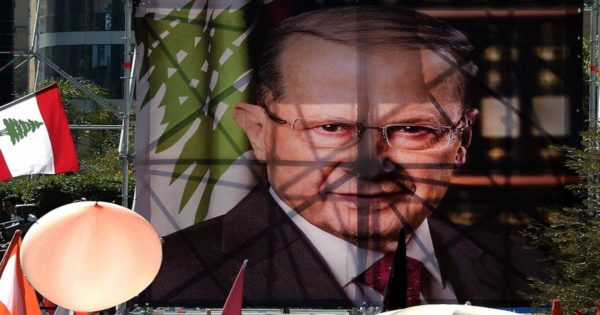Hezbollah may have secured its domestic flank through election of its ally Aoun but interminable war in Syria will continue to sap party’s resources.
Nicholas Blanford/The Arab Weekly/November 11/16
BEIRUT – The election of Michel Aoun as Lebanon’s 13th president cements Hezbollah’s immunity against domestic opposition and safeguards its military priorities — the simmering confrontation with Israel and its armed intervention in Syria.
Aoun’s inaugural speech, while generally bland and appeasing, included statements that confirmed that Hezbollah has emerged as the true winner from Lebanon’s protracted presidential crisis and vindicated the party’s decision, along with its allies in the March 8th parliamentary coalition, to boycott two-and-a-half years of electoral sessions until its candidate was assured success.
Referring to the conflict with Israel, Aoun said Lebanon would spare no effort “and no resistance” to liberate the occupied Lebanese territories and “protect our country from an enemy that still covets our land, water and natural resources”.
This formulation echoes Hezbollah’s justification for maintaining the Islamic Resistance, the name of its armed wing. Hezbollah’s argument long ago moved on from the assumption that the end of outstanding disputes between Israel and Lebanon would lead to a quid pro quo disarming.
In 2006, Ali Ammar, a Hezbollah MP, said the “extent of the resistance is not the Shebaa farms nor the return of the [Lebanese] prisoners [held in Israel, but its extent is when it becomes impossible for Israel to violate Lebanon’s sovereignty even with a paper kite”.
It is highly likely that the army-people-resistance formula, which helps legitimise the Islamic Resistance as an asset of Lebanese defence, will be retained in the official statement of the next government.
As for Syria, Aoun also had reassuring words for Hezbollah, saying that “terrorism”, meaning the version practised by extremist Sunni groups such as the Islamic State (ISIS), should be dealt with through pre-emption, deterrence and confrontation until it is eliminated.
The key word here is “pre-emption” as it helps gird Hezbollah’s argument that its intervention in Syria is intended to defend Lebanon against attack by groups such as ISIS: Better to fight them in Syria before they reach Lebanon.
The next government, headed by former prime minister Saad Hariri, will not pose an obstacle to Hezbollah’s domestic and regional agenda.
Hariri returns to the premiership holding a weak hand. His financial empire is in disarray; there is no cash to sustain his patronage networks and his decision to endorse Aoun for the presidency has further sapped his popular support on the Sunni street.
Rivals for the country’s Sunni leadership, particularly former Justice minister Ashraf Rifi, are beginning to snap at his heels. Rifi is sweeping up discontented Sunnis not only in his traditional fiefdom of Tripoli and the north but also in other Sunni regions further afield, such as the central Bekaa valley and Iqlim el-Kharroub north of Sidon.
Hariri cannot rely on the backing of Saudi Arabia as a counterweight to Hezbollah and Iranian influence in Lebanon. Under King Salman bin Abdulaziz Al Saud, Saudi Arabia’s interest in Lebanon has shrivelled amid more pressing issues for the kingdom, such as the war in Yemen, the struggle against Syrian President Bashar Assad and domestic economic difficulties.
Still, Hezbollah faces pressing challenges, particularly the heavy cost of the war in Syria on the morale of the party’s support base, even among the cadres themselves.
Iran’s Tasnim news agency reported that 33 Hezbollah fighters, including at least two commanders, were killed in Syria in October.
Traditionally, the process of recruitment into Hezbollah’s ranks takes months and consists of an initial vetting procedure, extensive religious classes and basic military training at the party’s camps strung along the flanks of the Bekaa valley.
While this arduous and thorough recruitment process is continuing for true believers in Hezbollah’s cause, the party is also scooping up recruits specifically to fight in Syria, luring them with monthly salaries and benefits and foregoing vetting and religious instruction.
These raw recruits are given a month-long basic training course before being dispatched to Syria’s front lines. There follows a brutal Darwinian process in which the unlucky or inept are quickly killed off while the luckier or more skilled live to fight another day.
There is, however, increasing anecdotal evidence to suggest that some fighters are tiring of the conflict, particularly of being deployed to places such as Aleppo that are far from Lebanon. A common refrain from these unhappy cadres is that they accept the rationale of fighting ISIS or Jabhat Fatah al-Sham in Qalamoun along Lebanon’s eastern border or defending the tomb of Sayyida Zeynab, the Prophet Mohammad’s daughter, in Damascus. But why do they need to fight in Aleppo?
Some fighters are refusing to return to Syria and say they will only pick up a gun again and fight with Hezbollah during the next conflict with Israel. Other fighters are leaving the party altogether.
It is unclear how deep such sentiment runs within Hezbollah’s ranks but the party apparently has formed a unit to address issues of low morale, underlining that the leadership takes the discontent seriously.
Hezbollah may have secured its domestic flank through the election of its ally Aoun as president but the interminable war in Syria will continue to sap the party’s resources and chip away at the morale of some cadres.
Nicholas Blanford is the author of Warriors of God: Inside Hezbollah’s Thirty-Year Struggle Against Israel (Random House 2011). He lives in Beirut.


















